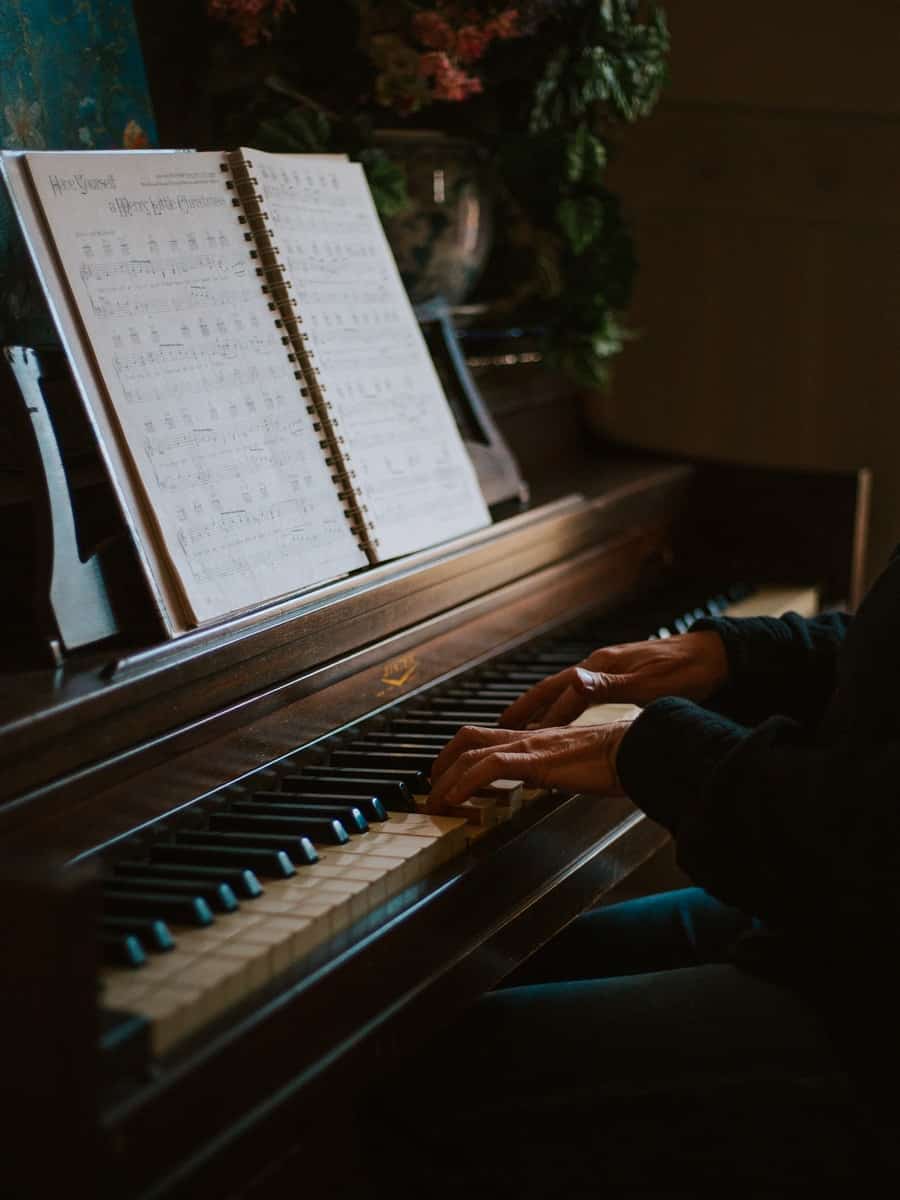14 Best Tips To Memorize Piano Music Faster
Here are 14 easy tips to help you memorize piano music fast!
Memorizing music can be one of the most rewarding things you will ever do. It can open up a whole new world of creativity and provide hours of pleasure for you and your family.
Table of Contents
1. Make Sure You Remember Each Hand Separately
This is the single best thing you can do to make sure you can play your music well.
Memorizing the music for each hand separately makes it much easier to learn the music in the first place, much easier to memorize both hands together, and much easier to play the music.
In addition, it is very helpful to have a “mental picture” of each hand by itself.
This will help you understand what each hand is doing individually, and also will help you understand how they work together.
2. Organize Music By Sections You Are Very Familiar With
This is an important tip that can save you hours of frustrating practice.
Look at the music you are going to learn and put a dot or a line or some other kind of mark on the spot where you are most fluent and comfortable playing.
Then, look at the music you have already learned and see if there is a spot that is very similar. If so, put a dot or a line or some other kind of mark on that spot also.
Soon, you will have a mental map of all the spots that are easy for you and all the spots that are not. And this will make it much easier for you to learn the tough spots too!
Learn One Key Spot At A Time.
When you are learning any new piece of music, it is best to learn just one key spot at a time. That way, you can be absolutely certain you will never play a mistake.
Look at your current “comfort zone” spots first. These will be the easiest spots for you to learn.
Next, work on the spots that are slightly harder.
Finally, put your attention on the spots that are truly difficult.
These are the spots you should spend the most time working on. And don’t worry if you spend more time on some spots than others. It’s normal. Just keep moving forward until the entire piece is easy and comfortable for you.
READ MORE:
3. Use A “Music Flashcard” System To Retain The Information
Flashcards are an excellent way to retain information. And using a music flashcard system will supercharge your learning!
Start by writing out each spot on a 3×5 index card. Next, shuffle all the cards and deal them in random order into three stacks.
Then, read through the first stack and read the notes on the cards as you go along. After you have read one section, move on to the second section. Continue until you have read all three sections.
Finally, put the cards away in three separate groups and don’t look at them again for one full week. Then, in one session, try to remember as many of the cards as you can. Repeat this every week for a month. Your memory should have improved significantly by the end of the month.
4. Mental Rehearsal to Memorize Piano Music
The next step is mental rehearsal.
Let’s say you are trying to learn a simple two-measure section of music. It is helpful to think about each individual measure as a stand alone item.
In other words, you are thinking about “measure 1” all by itself, and “measure 2” all by itself, and so on.
Now, play through the piece in your head several times while saying the notes out loud. Play slowly and imagine how each note sounds.
Once you are satisfied you can play the piece fluently in your head, start to play it as you would if you were performing the piece on a real piano. Do this until you can do it perfectly.
READ MORE:
5. Distraction And Interruptions Will Slow Down Memorization
Stay focused!
If you get interrupted or distracted at any time while you are practicing, go back and start the section over.
In contrast, if you allow your mind to wander, you will forget everything you just practiced and have to start over.
So, it’s important to stay focused and keep practicing. The more you practice, the better you will get.
Be here now. Don’t think about stuff you need to do later or the million other things you have to do this week.
READ MORE:
6. Make It Visual
Another thing you can do is “picture” the notes as you are learning them.
In other words, you are mentally drawing a picture of the notes as you are reading them. This will help you learn the order in which the notes are played too. Plus, it will help your long term memory.
To do this, read the notes and then visualize each note as it sounds. Then, read the next set of notes and see if you can still picture the first set of notes. Continue until you have learned all the notes.
READ MORE:
7. Make It Emotional
Yet another way to learn something is to find the “emotion” of the notes.
In other words, what does each note evoke in you? Do the notes make you feel happy, sad, angry, peaceful, or anything else?
You can use this method whenever you are learning a new piece or sequence of music. Simply start playing the piece and ask yourself “What is the emotional temperature of this piece?” “Do these notes make me feel warm or cold?”
You’ll find as you practice this exercise over and over that certain notes will tend to stand out from the rest. Those will be the notes that are the strongest emotionally for you.
You’ll also notice certain sections of music will have a stronger emotional temperature than other sections. Those will be the sections you should concentrate on practicing most.
8. Listen To Recordings Of The Pinao Music
Listening to audio recordings is an excellent way to learn almost anything.
But, it is especially useful for musicians because you can listen to a recording while simultaneously reading the written music.
This is a very effective way to memorize music.
However, there is a caveat: You must make sure the audio recordings you are listening to are of good quality. Otherwise, you will not get the full benefit of this powerful memory technique.
9. Putting Your Sheet Music Away
This is one of the most important suggestions in this entire list.
You see, after you learn a certain amount of music, you should stop reading the sheet music and start only looking at it when you are playing.
Why? Simply because; the more you read the sheet music, the more you will depend on that medium to deliver the information to you.
And, when you are done learning a certain amount of music, you should be relying on your memory rather than your sheet music. You see, your memory is far superior to your sheet music.
So, after a while, if you decide to not study the music anymore, your memory should be able to take over and do a much better job than if you are depending on the sheet music.
If you do this, you will soon find that you are reading the sheet music less and less, and eventually, you will be able to play the music without even looking at the sheet music.
10. Utilize Spaced Repetition
This is a tried and true memory technique used by all world-class memorizers. It is based on the idea that if you tell your brain to remember something over and over, it will eventually “remember” that information.
Spaced repetition is simply the process of reviewing a section of music, then waiting a while, and then reviewing the section, then waiting some more and on and on and on. The longer you space out your reviews, the more likely you’ll remember the music.
Anki is one of the best spaced repetition systems available and it’s free. It can seem complicated to use at first, but its powerful extensions are definitely worth investing the time to get familiar with.
READ MORE:
11. Be Aware Of Your Hands As You Play
You could focus on your hands as they play the notes. This will be another way to imprint the information on your long term memory.
Watching your hands could help you to focus, and you will be able to pay more attention to the details when you are playing.
In addition, watching your hands will give you a chance to see if you are getting the notes right. If you are not, you will immediately know when you are staring down a wrong note.
Also, watching your hands will give you an opportunity to see if you are keeping time correctly. If you are not, you will immediately know when you are playing too fast or too slow.
12. Memorize It By Your Ear
Yet another way to learn something is to do it by “ear”.
In other words, you should try to memorize the music by listening to it rather than reading it. This works especially well for musicians because you can listen while reading the written music.
It also works for non-musicians because you will be able to concentrate on the melody and harmony of the piece instead of trying to read the written notes.
To do this, find a section of music you want to learn and then, play the music as you read it. Do this over and over. Soon, you’ll have the music in your head and it will be easy as pie to play.
13. You Should Record Your Play
This will give you a chance to hear yourself play the music.
You should do this with both your original performances and also later when you are reviewing the music to help you imprint the information in your long term memory.
Doing this will give you yet another way to check your work. If you are doing this right, you should be able to easily playback the recording and get the music exactly as you heard it.
Also, you could ask a trusted friend or family member to listen to the audio recording of you playing and then, tell you if you are getting everything correct. This would be an excellent “double check” on your learning process.
14. Close Your Eyes While You Play
This is one of the most effective memory techniques of all. In fact, some people say closing your eyes is almost as important as actually playing the music.
It works like this: Your brain will attend to the experience of playing the music (the “feel”) rather than the reading of the written music (the “sound”). And, the more your brain pays attention to the feel, the more it will learn.
In other words; by paying attention to the “feel” of the music, you are training your brain to remember it.
If you do this, you will find that after a while, you will be able to play the piece without even looking at the music. You will be able to focus on the “experience” of playing the music and your brain will do the rest.
Conclusion
There are many different ways you can go about learning a new piece of music.
Which method you use is largely up to you and depends on your personality, how much time you have, and which method will be most effective for you.
However, there is one thing all of these methods have in common: They ALL require you to physically play the music.
This is an excellent way to ensure you actually learn the music. And, the more you learn the better you’ll become!
So, get out that instrument and give these memory techniques a shot. You may find one or more of them work better for you than the others. Or maybe all of them will work for you. Only you can tell.
However, the important thing is you are putting the process into action. And, that’s what really counts.
READ MORE:






